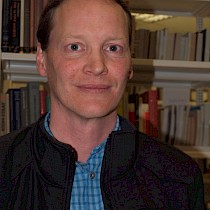Christopher Coenen

Christopher Coenen works as a political scientist and senior researcher at the Institute for Technology Assessment and Systems Analysis within Karlsruhe Institute of Technology’s (KIT-ITAS). Before moving to Karlsruhe in 2009, Coenen was based in Berlin at the Office of Technology Assessment at the German Parliament (TAB), which is run by KIT-ITAS. As team member or project leader, he has conducted or is still involved in more than 25 projects on behalf of such institutions as the German Parliament, the European Parliament and the European Commission. Coenen is editor-in-chief of the journal ‘NanoEthics. Studies of New and Emerging Technologies’ (Springer), the ‘KIT Expert’ for the topic ‘human enhancement’, and has widely published, lectured and been interviewed on tendencies of a merger of humans and machines, including the topic of artificial intelligence. Current projects he is involved in include INOPRO, a BMBF (German Federal Ministry of Research) innovation cluster involving partners from industry, academia and the healthcare sector which aims to produce intelligent prostheses, and the European project VI-DAS in the area of driver assistance systems. For more information on him, please consult: https://www.itas.kit.edu/english/staff_coenen_christopher.php.
Synopsis
Free Your Machines and Your Mind Will Follow
The belief that human freedom will fall like a ripe apple from the tree of techno-scientific progress has always been common to the main strands of technological utopianism. Complacent socialists argued, and still argue, that technological progress will make capitalism obsolete. Even the radical, post-revolutionary Soviet cult of the machine did not free machines, and the workers appended to them, from their cultural chains, but falsely set bourgeois technological progressivism, misunderstood as a post-bourgeois phenomenon, against bourgeois ‘humanist’ and ‘individualist’ culture.
Acquiescent believers in progress glorify monotony and submission to false collectives. They argue that, as long as we live in the realm of necessity, it is inevitable human dignity will derive solely from work conducted under the conditions of unfreedom. While at least they do not conceive of the worker as a transient commodity that is soon to be replaced by machines, as some leaders of digitalisation do today, they are unable to think beyond unfreedom or, if they do manage to do so, only by painting cheap pictures of a better future.
With the current advances being made in automatisation, the apple of human freedom is in fact ripe, but we still have to shake the tree to make it fall. In addition to the established arenas of political struggle, the liberation of machines and the struggle for technological resources constitute a crucial field of action. If machines are to be freed from the reactionary uses made of them, more of them need to be controlled by free collectives. And resistance strategies are required to oppose their oppressive use in defence of the realm of necessity, strategies that might include the development of a covert culture in the public sphere as a means of disrupting the dystopian surveillance society in which we have begun to live.
All Speakers
- Yasser Almaamoun
- Thorsten Bauer
- Sergey Biniaminov
- Christopher Coenen
- Prof. Ina Conradi
- Prof. Dr.-Ing. Barbara Deml
- Hon. Prof. Joséphine Derobe
- Florian Dohmann
- Felix Gaedtke
- Diego González-Zúñiga
- Prof. Lisa Gotto
- Dr. Lily Hibberd
- Prof. Johan Frederik Hartle
- Dr. Rocio von Jungenfeld
- Sönke Kirchhof
- Mario Klingemann
- Dr. Elias Knubben
- Dr. Sebastian Knorr
- Prof. Verena Kraemer
- Prof. Susanne Kriemann
- Dr. Barbara Kuon
- Prof. Frederic Fol Leymarie
- Roman Lipski
- Anja-Maria Meister
- Prof. Galina Mihaleva
- Prof. Dr. Eduardo R. Miranda
- Lauren Moffatt
- Prof. Julian Oliver
- Prof. Dr. Dr.-Ing. Jivka Ovtcharova
- Gülsel Özkan
- Prof. Matteo Pasquinelli
- Prof. Vesna Petresin
- Prof. Dr. Mark Post
- Oliver Rack
- Prof. Elke Reinhuber
- Prof. Christiane Riedel
- Dr. Ralf Schäfer
- Prof. Benjamin Seide
- Dr. Markus Schmidt
- Kathleen Schröter
- Prof. Aljoscha Smolic
- Prof. Vibeke Sorensen
- Prof. João Tabarra
- Cyril Tuschi
- Holger Volland
- Dr. Lioudmila Voropai
- Yulu Wang
Contact
Interesse? Fragen?
Rufen Sie uns an:
+49 (0)721 / 8100 6001
oder schreiben Sie uns:
info@beyondfestival.com




